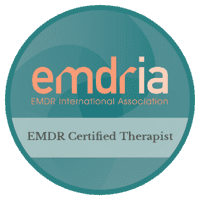The Magic of the Vagus Nerve

Anxiety is a normal part of life – there is always something to worry about, dread, fret over, or be stressed by. These days it often feels like there is more to be uneasy about, but we aren’t all anxious to the same degree. Some people seem to be able to recovery more quickly from stress, fear, and anxiety.Perhaps these people have strong vagal tone.
Vagal tone refers to activity of the vagus nerve. The vagus nerve is the longest nerve in your body. It connects the brain to tissues and organs elsewhere in the body (1). It plays an important role in activating the parasympathetic (calm, rest, digest, relax, and repair) branch of the nervous system to turn off the stress, hyper-aroused, fight, flight, and freeze sympathetic response. Additionally, the vagus monitors your gut for pathogens and initiates a response to control inflammation which can affect your mood, your stress level, and your overall inflammation levels (2). Vagal tone reflects the activity of your body’s ability to successfully respond to stress, adverse life events, and environmental conditions. Once the threat has passed, good vagal tone lowers stress hormone levels, and other systems resume their regular activities (3).
But when stressors are always present and you constantly feel under attack, that fight-or-flight reaction stays on. If the vagus nerve is unable to activate the relaxation signal, the sympathetic nervous system keeps active with the stimulation of cortisol and adrenaline (stress hormones). This means we are living in a more-or-less constant state of fight-or-flight. This state wreaks havoc on your mental and physical health.
However, some people’s vagal tone is stronger than others which allows their body to relax more quickly after an adrenaline and cortisol rush. There is much evidence that the vagus nerve can be stimulated to improve vagal tone.
So how do I increase my vagal tone?
So far, researchers have stimulated the vagus nerve using a device that emits an electrical current. The good news is that you can stimulate the vagal nerve naturally and help improve positive emotions, physical health, and social connections (6).
- Use your vocal cords: Because the vagus nerve is connected to your vocal cords, systematic humming can stimulate the nerve. Likewise, speaking, singing, and laughter are beneficial.
- Wash your face in cold water: when your body is required to adjust to the cold, or fight-or-flight (sympathetic) system declines and your rest-and-digest (parasympathetic) system increases (4).
- Breathing deeply using your diaphragm: breathing long, deep breaths from your diaphragm can stimulate the vagus nerve. See my video on our Facebook page.
- Yoga: research shows that yoga, along with breathing practices, can significantly increase your vagal tone (5).
- Meditation: meditation is a tool you can use anytime, whether it is for a few minutes or for a longer period of time. This can simply be taking a few deep breaths and notice what other sensations you feel in your body. Meditation is a great time to manifest positive thoughts and to practice deep breathing as mentioned above.
- Increase Good Gut Bacteria: this helps to create a positive feedback loop through your vagus nerve, therefore increasing tone.
Add these simple tips consistently to your daily self care routine and see how much better you feel.
If you suffer from anxiety, call us today at The Center for Hope & Healing, 936-249-6140 or www.thecenterforhopeandhealing.net.
Life is better without struggling with anxiety.
Sources
- www.medicalnewstoday.com/articles/318128
- dailyhealthpost.com/ways-to-stimulate-vagus-nerve-naturally
- www.mayoclinic.org/healthy-lifestyle/stress-management/in-depth/stress/art-20046037
- pubmed.ncbi.nlm.nih.gov/18785356/
- www.ncbi.nlm.nih.gov/pmc/articles/PMC6189422
- https://theheartysoul.com/6-ways-to-instantly-stimulate-your-vagus-nerve/
The material provided in this post is for informational and educational purposes. Please consult a qualified physician or qualified health professional on any matters regarding your health or well-being or on any opinions expressed within this post. Neither the company nor the authors of any information provided accept responsibility for the actions or consequential results of any action taken by the reader.



